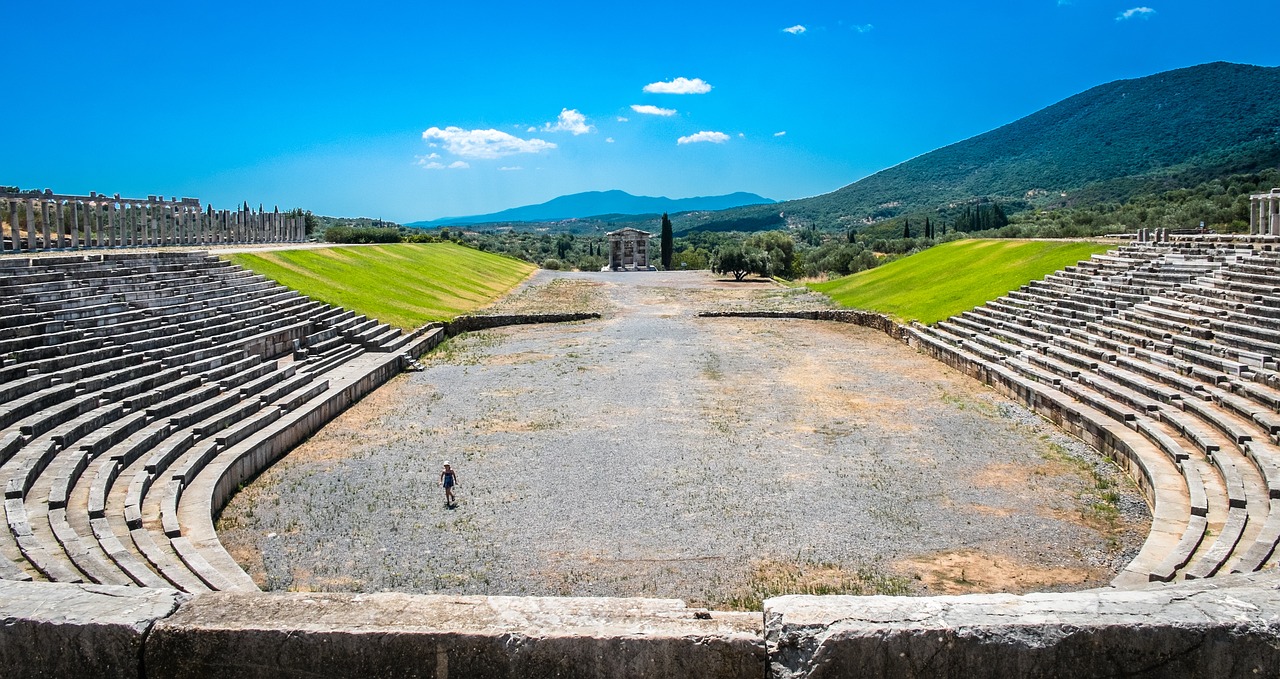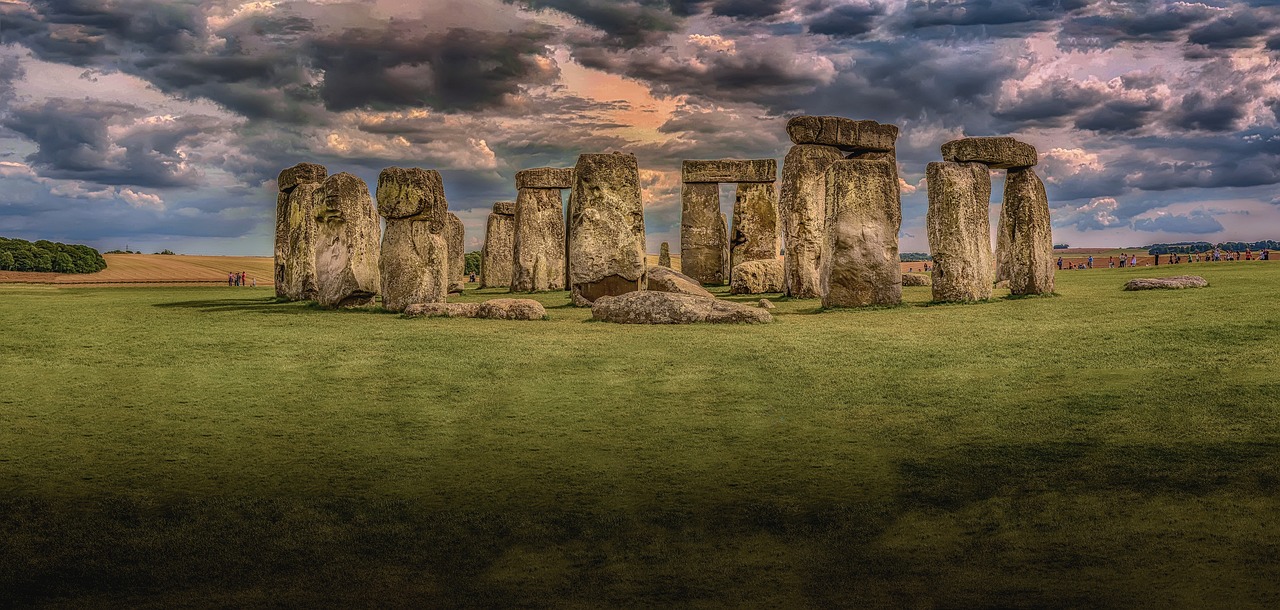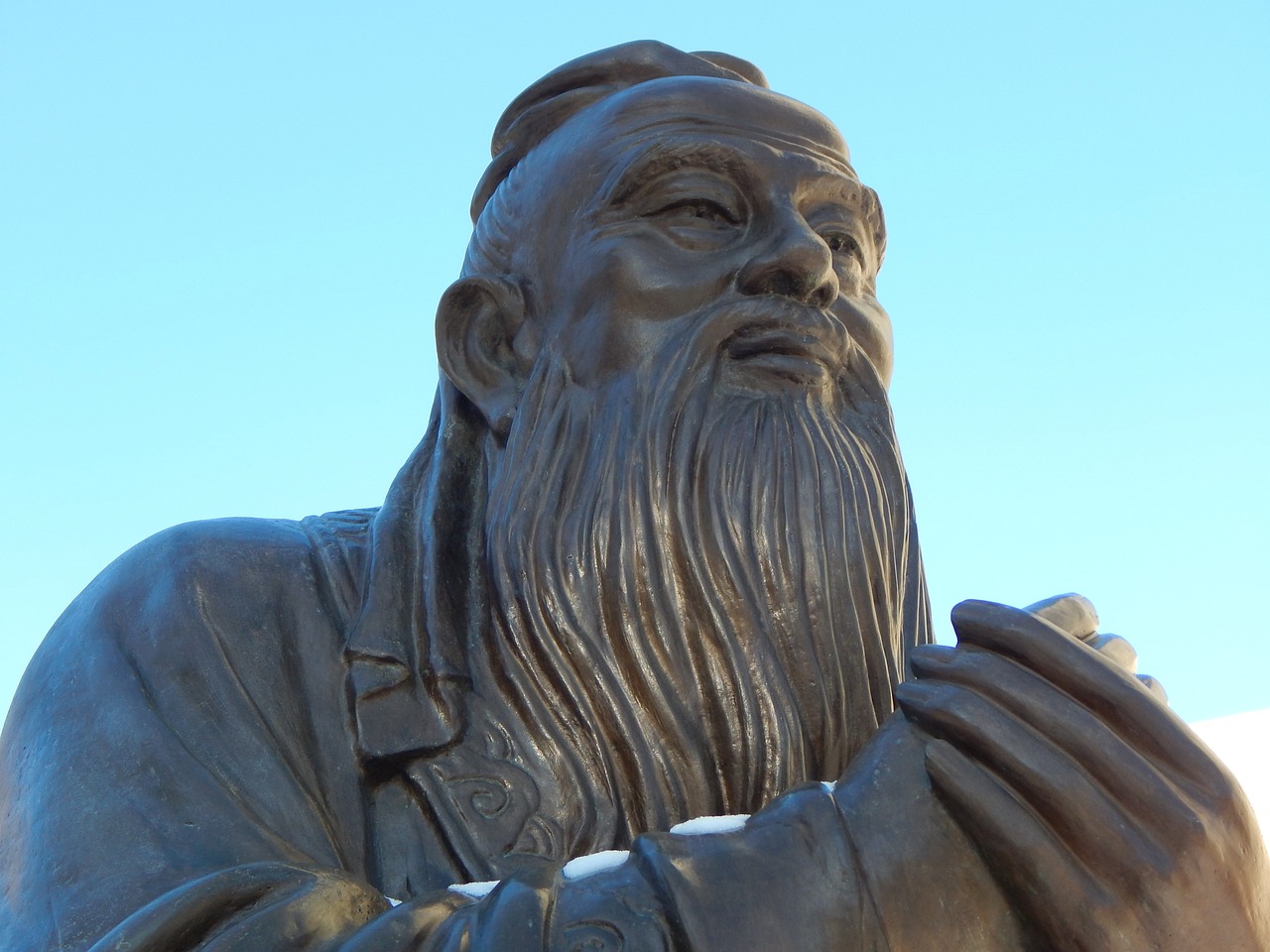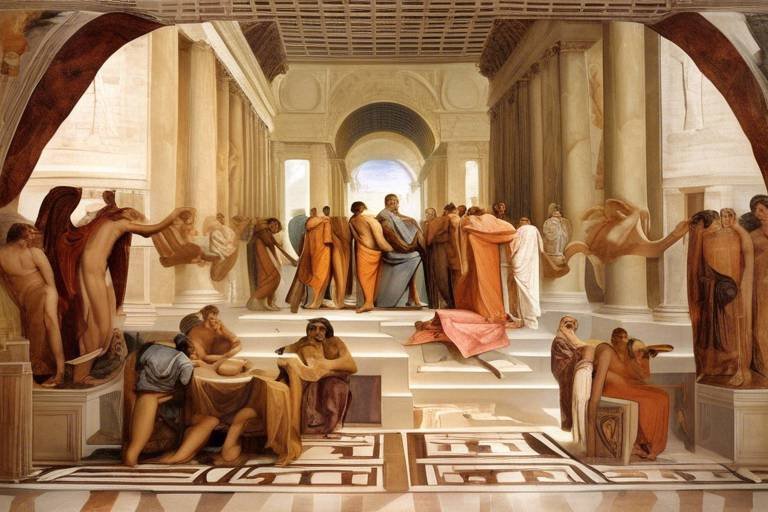The Role of Philosophy in Ancient Civilization
Philosophy has played a pivotal role in shaping ancient civilizations, acting as a guiding light in the realms of culture, governance, and scientific thought. Imagine a world where questions about existence, morality, and the universe were pondered deeply by thinkers who laid the foundation for modern society. This rich tapestry of philosophical inquiry not only influenced the way people lived but also how they governed themselves and understood the world around them. From the bustling streets of Athens to the serene landscapes of ancient China, the echoes of philosophical debate can be heard, resonating through time.
In ancient civilizations, philosophy was more than just an academic pursuit; it was a way of life. It provided a framework for understanding the complexities of human existence and the universe. Thinkers like Socrates, Plato, and Confucius didn’t just ask questions for the sake of inquiry; they sought to transform society through their ideas and teachings. Their thoughts on ethics, governance, and the nature of reality continue to influence our modern world. Philosophy helped cultivate a sense of critical thinking and ethical reasoning, essential tools that enabled societies to thrive and evolve.
Moreover, the influence of philosophy extended beyond individual thought, permeating the very fabric of governance. The principles of justice, democracy, and the ideal state were not merely theoretical concepts; they were practical frameworks that ancient societies used to structure their governments. The teachings of philosophers shaped laws and societal norms, creating a legacy that would endure for centuries. As we explore the various dimensions of philosophy's impact on ancient civilizations, we will uncover the profound connections between thought and action, reason and governance, and how these elements combined to propel humanity forward.
In this article, we will delve into the origins of ancient philosophy, its influence on governance, and its relationship with science. We will examine how the philosophical inquiries of the past have laid the groundwork for contemporary thought and practice. So, let’s embark on this journey through time and explore the everlasting legacy of philosophy in shaping our world.
- What is the significance of ancient philosophy?
Ancient philosophy is significant because it laid the groundwork for critical thinking, ethics, and governance, influencing modern thought and societal structures. - How did philosophers influence governance?
Philosophers like Plato and Aristotle provided frameworks for justice and democracy, shaping political structures and ideals in ancient civilizations. - What is natural philosophy?
Natural philosophy is the precursor to modern science, focusing on understanding the natural world and existence through philosophical inquiry.

Origins of Ancient Philosophy
Ancient philosophy is a fascinating tapestry woven from the threads of diverse civilizations, each contributing unique perspectives that laid the groundwork for critical thinking and ethical inquiry. The origins of this intellectual movement can be traced back to several key regions, including Mesopotamia, Egypt, and the early thinkers of Greece. Each of these cultures played a pivotal role in shaping philosophical thought, which would eventually influence not only their societies but also the entire course of human history.
In Mesopotamia, one of the world's earliest civilizations, the seeds of philosophy were planted in the fertile soil of their rich literary and cultural traditions. The Sumerians and Akkadians produced texts that explored the nature of existence, morality, and the divine. For instance, the famous Epic of Gilgamesh raises profound questions about life, death, and the human condition, showcasing an early form of philosophical inquiry.
Moving westward to ancient Egypt, we find another vibrant source of philosophical thought. Egyptian philosophy was deeply intertwined with religion and ethics, often focusing on the concepts of Ma'at, which represents truth, balance, and cosmic order. The teachings of the Wisdom Literature, such as the Instruction of Ptahhotep, emphasized moral virtues and the importance of wisdom in governance and personal conduct. This blend of morality and governance reflects an early understanding of ethics that would resonate throughout history.
However, it was in ancient Greece that philosophy truly began to flourish as a distinct discipline. The Greeks shifted from mythological explanations of the world to a more rational and systematic approach to understanding reality. Thinkers such as Thales, often considered the first philosopher, sought natural explanations for phenomena, marking a significant departure from supernatural interpretations. His inquiries laid the groundwork for what we now call natural philosophy, where questions about the cosmos, existence, and the nature of reality began to take center stage.
The transition from mythos to logos, or reason, was a revolutionary shift that would define Greek philosophy. This evolution set the stage for later philosophers like Socrates, Plato, and Aristotle, who would further refine and expand upon these early ideas. Their contributions would not only influence Greek society but also echo through the ages, impacting subsequent civilizations and shaping the very foundations of Western thought.
In summary, the origins of ancient philosophy are a rich blend of cultural influences and intellectual pursuits. From the moral teachings of Egyptian wisdom to the rational inquiries of Greek thinkers, each civilization added its own unique flavor to the philosophical landscape. This early engagement with fundamental questions about existence, ethics, and governance set the stage for the profound developments that would follow in the realms of science, politics, and culture.
- What is the significance of ancient philosophy? Ancient philosophy laid the groundwork for critical thinking and ethical inquiry, influencing various fields such as governance, science, and culture.
- Which civilizations contributed to the origins of philosophy? Key civilizations include Mesopotamia, Egypt, and ancient Greece, each offering unique perspectives and ideas.
- Who were the major philosophers of ancient Greece? Major figures include Socrates, Plato, and Aristotle, who made significant contributions to political and ethical thought.

Influence on Governance
Philosophy has played a pivotal role in shaping the governance structures of ancient civilizations, influencing how societies organized themselves and made decisions. The thoughts and writings of philosophers provided frameworks for understanding justice, the nature of power, and the responsibilities of rulers. Think about it: when we look back at history, we see that the ideas of a few influential thinkers have not only shaped their own societies but have also resonated through the ages, influencing modern governance.
One of the most significant contributions came from ancient Greece, where philosophers like Plato and Aristotle laid the groundwork for political theory. Their ideas about governance were not just theoretical; they offered practical insights that were applied in various city-states. For instance, Plato's vision of an ideal state, as expressed in his work The Republic, proposed that a society should be governed by philosopher-kings—wise individuals who understand the true nature of justice and virtue. He argued that only those who possess knowledge and wisdom should lead, ensuring that decisions are made for the common good rather than personal gain.
On the other hand, Aristotle took a more pragmatic approach. He believed in the importance of a balanced government that considered the needs of the middle class. Aristotle's political theory emphasized the concept of constitutional government, where laws are established to ensure fairness and equality. He argued that a well-structured government could prevent the corruption that often arises from absolute power. His thoughts on governance were revolutionary, encouraging the idea that citizens should actively participate in political life, thus laying the foundation for modern democratic principles.
But the influence of philosophy on governance wasn't limited to the West. In Eastern civilizations, philosophies like Confucianism and Daoism also had a profound impact on governance. Confucianism, for example, emphasized the importance of moral integrity and the role of virtuous leaders. Confucian teachings advocated for a government that prioritizes the welfare of the people, establishing a moral framework for rulers to follow. This idea of ethical leadership became a cornerstone of Chinese governance for centuries, illustrating how philosophical ideas can deeply embed into the fabric of a civilization.
Furthermore, the integration of philosophical thought into governance often led to the establishment of legal systems that reflected these ideals. For instance, many ancient societies adopted laws that were influenced by philosophical principles of justice and morality. This intersection of law and philosophy not only guided rulers in their decision-making but also provided citizens with a sense of order and fairness in society.
In summary, the influence of philosophy on governance throughout ancient civilizations cannot be overstated. It provided the intellectual tools necessary for understanding complex societal issues and laid the groundwork for systems of governance that prioritize justice, ethics, and the well-being of the populace. As we continue to explore the contributions of philosophy, we see that its impact extends far beyond the confines of academia, shaping the very structures that govern our lives.
- How did ancient philosophy influence modern governance?
Ancient philosophy introduced concepts such as democracy, justice, and ethical leadership, which continue to inform modern political systems and practices. - What role did Plato play in shaping governance?
Plato advocated for a government led by philosopher-kings, emphasizing that only those with wisdom should rule to ensure justice and the common good. - How did Eastern philosophies impact governance?
Philosophies like Confucianism emphasized moral integrity and the welfare of the people, influencing governance structures in societies like China.

Philosophy in Ancient Greece
When we think about the foundations of Western thought, Ancient Greece pops into our minds like a bright star in the night sky. This era was not just about epic battles and magnificent temples; it was a vibrant period where thinkers like Socrates, Plato, and Aristotle laid the groundwork for philosophy as we know it today. These philosophers didn't just ponder life in isolation; they engaged with the world around them, challenging the norms and asking the big questions that still resonate today: What is justice? What is the good life? And how should we govern ourselves?
The influence of these thinkers extended far beyond their lifetimes, shaping not only political theory but also ethical frameworks that would guide civilizations for centuries. For instance, Socrates, often regarded as the father of Western philosophy, introduced the Socratic method—a form of cooperative argumentative dialogue that encourages critical thinking. He believed that through questioning, individuals could uncover deeper truths about themselves and the world. This method is still used in modern classrooms, demonstrating the enduring power of his ideas.
Following in Socrates' footsteps, Plato took the stage with his profound dialogues that explored the nature of reality and the ideal state. In his famous work, The Republic, he envisioned a society governed by philosopher-kings—wise rulers who would prioritize the common good over personal ambition. This concept of governance, where wisdom and virtue are paramount, has sparked debates through the ages about the qualifications necessary for leadership. Plato’s allegory of the cave, where prisoners mistake shadows for reality, serves as a powerful metaphor for enlightenment, urging individuals to seek knowledge beyond mere appearances.
Then we have Aristotle, a student of Plato, who introduced a more pragmatic approach to philosophy. While Plato focused on ideals, Aristotle grounded his philosophy in the tangible world. He emphasized the importance of the middle class in governance, arguing that a balanced society is crucial for stability. His works on ethics and politics laid the foundation for various fields, including biology, logic, and metaphysics. Aristotle’s belief that the purpose of human life is to achieve eudaimonia—a flourishing life—continues to influence our understanding of happiness and fulfillment today.
To summarize the contributions of these ancient Greek philosophers, let's take a look at the table below:
| Philosopher | Key Contributions | Major Works |
|---|---|---|
| Socrates | Socratic Method, Ethical Inquiry | None written; teachings recorded by Plato |
| Plato | Theory of Forms, Philosopher-Kings | The Republic, Phaedrus |
| Aristotle | Empirical Observation, Ethics of Virtue | Nicomachean Ethics, Politics |
The legacy of these thinkers is not just academic; it permeates our daily lives, influencing how we think about governance, ethics, and the pursuit of knowledge. Their ideas encourage us to question our surroundings and strive for a deeper understanding of our existence. In a world that often feels chaotic, the philosophical inquiries of Ancient Greece remind us that the quest for wisdom is a timeless endeavor.
- What was the main focus of Ancient Greek philosophy? Ancient Greek philosophy primarily focused on understanding the nature of reality, ethics, governance, and the pursuit of knowledge.
- Who is considered the father of Western philosophy? Socrates is often referred to as the father of Western philosophy due to his significant contributions to ethical inquiry and the development of the Socratic method.
- How did Plato's ideas influence political thought? Plato's concept of philosopher-kings and the ideal state in "The Republic" has profoundly influenced political theory and discussions about governance.
- What is Aristotle's contribution to ethics? Aristotle introduced the idea of eudaimonia, or flourishing, as the ultimate goal of human life, emphasizing the importance of virtue and practical wisdom.

Plato's Ideal State
Plato's vision of an ideal state, as articulated in his seminal work The Republic, is nothing short of revolutionary. He proposed a society where the ruling class would be composed of philosopher-kings—wise individuals who possess both knowledge and virtue. This idea might seem abstract, but it serves as a profound commentary on the nature of governance and the qualities that leaders should embody. Imagine a world where decisions are made not by the whims of the powerful, but by those who truly understand justice, ethics, and the common good. Doesn’t that sound appealing?
In Plato's ideal state, the society is structured into three distinct classes: the rulers, the auxiliaries (warriors), and the producers (farmers and artisans). Each class plays a crucial role in maintaining harmony and order. The rulers, being the most knowledgeable, are tasked with making decisions for the greater good. The auxiliaries are responsible for protecting the state, while the producers ensure that the economy functions smoothly. This tripartite structure is not just a theoretical framework; it reflects Plato's belief in the importance of specialization and the idea that everyone has a role to play in society.
Plato argues that true justice can only be achieved when each class performs its function without overstepping its bounds. He famously uses the analogy of a well-tuned musical harmony to describe this balance. Just as each note contributes to a beautiful melody, each class must contribute to the overall well-being of the state. This leads us to ponder: what happens when one class tries to dominate the others? Chaos ensues, and the very fabric of society begins to unravel.
Moreover, Plato emphasizes the importance of education in his ideal state. He believed that only through rigorous education could individuals ascend to the ranks of the philosopher-king. This education is not merely academic; it involves moral and ethical training to cultivate virtues such as wisdom, courage, and moderation. Plato's allegory of the cave illustrates this concept beautifully. He suggests that most people live in a state of ignorance, only seeing shadows of reality. It is the philosopher's duty to emerge from the cave, grasp the truth, and lead others towards enlightenment.
To encapsulate Plato's vision, let's consider a few key characteristics of his ideal state:
- Philosopher-Kings: Rulers who are wise and virtuous.
- Class Structure: Society divided into rulers, auxiliaries, and producers.
- Education: A rigorous system that fosters moral and intellectual growth.
- Justice: Achieved when each class performs its designated role.
In conclusion, Plato's ideal state challenges us to think critically about our own governance structures. Are our leaders truly qualified to rule? Are they guided by wisdom and virtue? By advocating for a society led by philosopher-kings, Plato not only laid the groundwork for future political thought but also invited us to reflect on the nature of justice and the responsibilities of leadership. His ideas continue to resonate today, urging us to strive for a society where knowledge and ethics guide our collective journey.
- What is the main idea of Plato's ideal state? Plato's ideal state advocates for a society governed by philosopher-kings who possess wisdom and virtue, ensuring justice and harmony.
- How does Plato's class structure work? Plato divides society into three classes: rulers (philosopher-kings), auxiliaries (warriors), and producers (farmers and artisans), each with distinct roles.
- Why is education important in Plato's ideal state? Education is crucial as it prepares individuals to become philosopher-kings, fostering moral and intellectual growth necessary for just governance.
- What role does justice play in Plato's vision? Justice is achieved when each class performs its function correctly, contributing to the overall well-being of the state.

The Republic,
This article explores the significant contributions of philosophy to the development of ancient civilizations, examining its influence on culture, governance, and scientific thought throughout history.
Ancient philosophy emerged in various civilizations, laying the groundwork for critical thinking and ethical inquiry. This section delves into its roots in Mesopotamia, Egypt, and early Greek thought.
Philosophy shaped political structures and governance in ancient civilizations. This section discusses how philosophers like Plato and Aristotle influenced concepts of justice, democracy, and the ideal state.
Ancient Greece is often regarded as the cradle of Western philosophy. This subsection examines the contributions of key figures such as Socrates, Plato, and Aristotle to political and ethical thought.
Plato's vision of an ideal state, as outlined in The Republic, emphasizes the role of philosopher-kings. This section explores his arguments for a just society governed by wisdom. In The Republic, Plato presents a dialogue that not only questions the nature of justice but also proposes a structured society where individuals are assigned roles based on their abilities and knowledge. He famously introduces the concept of the "Noble Lie," a myth told to maintain social harmony and promote the common good. This idea reflects his belief that a well-ordered society requires a foundation of trust and shared values.
In Plato's ideal society, the ruling class consists of philosopher-kings—individuals who possess both love for wisdom and the capability to govern justly. He argues that only those who truly understand the Forms, particularly the Form of the Good, are fit to lead. This leads us to ponder: can wisdom alone determine the best course for society? Plato believed that knowledge is power, and thus, only the knowledgeable should wield political authority. This notion continues to spark debates about the qualifications necessary for leadership in contemporary governance.
Aristotle's pragmatic approach to governance focused on the importance of the middle class and constitutional government. This subsection analyzes his views on ethics and politics.
Eastern philosophies, particularly Confucianism and Daoism, significantly influenced societal values and governance. This section highlights their teachings and their lasting impact on cultures in China and beyond.
The interplay between philosophy and science in ancient civilizations fostered advancements in various fields. This section explores how philosophical inquiry laid the groundwork for scientific thought and exploration.
Natural philosophy, the precursor to modern science, focused on understanding the natural world. This subsection discusses how ancient thinkers like Thales and Aristotle approached questions of nature and existence.
The relationship between ethics and scientific inquiry was crucial in ancient civilizations. This section examines how philosophical discussions on morality influenced scientific practices and societal norms.
- What is the main theme of Plato's The Republic?
The main theme revolves around justice and the ideal state, exploring how a society can achieve harmony through the rule of philosopher-kings. - How did Aristotle contribute to political philosophy?
Aristotle emphasized the importance of the middle class and advocated for a constitutional government that balances the interests of different social groups. - What impact did Eastern philosophies have on governance?
Eastern philosophies like Confucianism and Daoism shaped societal values and provided ethical frameworks that influenced governance in China and beyond. - How did ancient philosophy influence modern science?
Ancient philosophy laid the groundwork for scientific inquiry by encouraging critical thinking and the exploration of natural phenomena.

emphasizes the role of philosopher-kings. This section explores his arguments for a just society governed by wisdom.
This article explores the significant contributions of philosophy to the development of ancient civilizations, examining its influence on culture, governance, and scientific thought throughout history.
Ancient philosophy emerged in various civilizations, laying the groundwork for critical thinking and ethical inquiry. This section delves into its roots in Mesopotamia, Egypt, and early Greek thought.
Philosophy shaped political structures and governance in ancient civilizations. This section discusses how philosophers like Plato and Aristotle influenced concepts of justice, democracy, and the ideal state.
Ancient Greece is often regarded as the cradle of Western philosophy. This subsection examines the contributions of key figures such as Socrates, Plato, and Aristotle to political and ethical thought.
Plato's vision of an ideal state emphasizes the role of philosopher-kings. He argued that only those who possess true knowledge and wisdom should govern, as they can make decisions that benefit the entire society rather than serving personal interests. In his work, The Republic, Plato posits that a just society is one where rulers are not merely politicians, but philosophers who understand the essence of justice and the good life. This concept of philosopher-kings is crucial because it suggests that wisdom, rather than wealth or power, should be the basis of governance.
Plato believed that philosopher-kings would create a harmonious society through their understanding of the Forms, particularly the Form of the Good. He argued that these rulers, trained in philosophy, would be able to see beyond the shadows of the cave—an allegory he famously used to illustrate the difference between the world of appearances and the world of reality. By grasping the true nature of justice, they could enact laws and policies that reflect the highest moral standards.
Furthermore, Plato's arguments for a just society governed by wisdom include the idea that a well-ordered state must align with the virtues of wisdom, courage, moderation, and justice. He believed that if rulers are wise, they would not only seek their own benefit but would also work towards the common good. This leads to a society where citizens are educated and virtuous, contributing to a stable and peaceful community.
In essence, Plato's notion of philosopher-kings is not just a theoretical construct; it serves as a powerful critique of contemporary political systems that often prioritize power and wealth over wisdom and virtue. His vision challenges us to think about the qualities we value in our leaders and the importance of philosophical inquiry in shaping just societies.
Aristotle's pragmatic approach to governance focused on the importance of the middle class and constitutional government. This subsection analyzes his views on ethics and politics.
Eastern philosophies, particularly Confucianism and Daoism, significantly influenced societal values and governance. This section highlights their teachings and their lasting impact on cultures in China and beyond.
The interplay between philosophy and science in ancient civilizations fostered advancements in various fields. This section explores how philosophical inquiry laid the groundwork for scientific thought and exploration.
Natural philosophy, the precursor to modern science, focused on understanding the natural world. This subsection discusses how ancient thinkers like Thales and Aristotle approached questions of nature and existence.
The relationship between ethics and scientific inquiry was crucial in ancient civilizations. This section examines how philosophical discussions on morality influenced scientific practices and societal norms.
- What is the main idea behind Plato's philosopher-kings?
Plato believed that only those who possess true knowledge and wisdom should govern, as they can make decisions that benefit society as a whole. - How did Aristotle differ from Plato in his political theories?
While Plato emphasized the need for philosopher-kings, Aristotle focused on the importance of the middle class and practical governance through constitutional means. - What impact did ancient philosophy have on modern governance?
Ancient philosophical ideas about justice and ethics continue to influence contemporary political thought and systems of governance today.

Aristotle's Political Theory
Aristotle, a towering figure in ancient philosophy, took a pragmatic approach to governance that still resonates today. Unlike his mentor Plato, who dreamed of a utopian society ruled by philosopher-kings, Aristotle grounded his political theory in the real world. He emphasized the importance of the middle class as the backbone of a stable society, arguing that a government should reflect the diversity of its citizens. This idea was revolutionary; it suggested that a balanced polity could prevent the excesses of both tyranny and mob rule.
In his seminal work, Politics, Aristotle categorizes governments into three ideal types: monarchy, aristocracy, and polity, each with its corrupt counterpart: tyranny, oligarchy, and democracy. He believed that the best government was one that aimed for the common good rather than the interests of a select few. To Aristotle, the ideal state was not just a political structure but a community that nurtured the moral and intellectual virtues of its citizens.
What makes Aristotle's political theory particularly compelling is his insistence on the role of virtue ethics in governance. He posited that a good ruler is not merely a strategist but a moral individual whose character shapes the laws and policies of the state. This perspective introduces a fascinating dynamic between ethics and politics, suggesting that the two cannot be separated without undermining the very fabric of society. Aristotle argued that laws should cultivate virtue among citizens, thus creating a more harmonious and just community.
Aristotle's insights into governance also extend to the concept of constitutional government. He advocated for a mixed form of government that incorporated elements of democracy and oligarchy, believing that this would balance the interests of different social classes. In his view, the middle class was essential because they were less likely to pursue extreme measures that could destabilize the state. By promoting a government that includes various social strata, Aristotle laid the groundwork for modern democratic principles.
To summarize Aristotle's political theory, we can highlight key elements in the following table:
| Type of Government | Ideal Form | Corrupt Form |
|---|---|---|
| Monarchy | Rule by one virtuous leader | Tyranny |
| Aristocracy | Rule by a few virtuous individuals | Oligarchy |
| Polity | Rule by many for the common good | Democracy |
In conclusion, Aristotle's political theory offers a rich tapestry of ideas that encourage us to think deeply about the nature of governance. His emphasis on virtue, the importance of the middle class, and the balance of power within the state are concepts that remain relevant in contemporary political discourse. By understanding Aristotle's insights, we can better appreciate the complexities of our own political systems and strive for a governance model that promotes the common good.
- What is Aristotle's view on democracy?
Aristotle viewed democracy as a form of government that could lead to mob rule if not balanced with the interests of the middle class. - How does Aristotle define virtue in governance?
He believed that a good ruler should embody moral virtues that promote the well-being of the community. - What are the key components of Aristotle's ideal state?
His ideal state includes a mixed government that incorporates elements of democracy and oligarchy, fostering stability and promoting the common good.

Philosophy in Eastern Civilizations
When we think about philosophy, many of us might picture the grand debates of Ancient Greece. However, the East has its own rich tapestry of philosophical thought that has profoundly shaped societies, cultures, and governance. Eastern philosophies, particularly Confucianism and Daoism, have provided frameworks for ethical behavior, social harmony, and political governance that resonate even today.
Confucianism, founded by Confucius in the 5th century BCE, emphasizes the importance of morality, social relationships, and justice. It teaches that a well-ordered society is built on the foundation of strong familial bonds and respect for elders. Confucius argued that individuals should strive for ren (benevolence) and li (proper conduct), which serve as guiding principles for personal and political life. This philosophy not only influenced personal ethics but also laid the groundwork for the bureaucratic systems that governed Chinese society for centuries. The emphasis on education and moral integrity in leadership can be seen as a precursor to modern governance.
On the other hand, Daoism, attributed to Laozi, offers a contrasting perspective. It advocates for harmony with the Dao (the Way), which emphasizes naturalness, simplicity, and spontaneity. Daoism teaches that individuals should align themselves with the rhythms of nature, promoting a sense of peace and tranquility. This philosophy has profoundly influenced Chinese culture, art, and medicine, encouraging a holistic view of the world that values balance and interconnectedness.
These philosophies have not only shaped individual behavior but have also had significant implications for governance. For instance, the Confucian ideal of a benevolent ruler who leads by moral example has been integral to the concept of leadership in various Asian cultures. In contrast, Daoist thought has contributed to a more relaxed approach to governance, where rulers are encouraged to govern less and allow the natural order to prevail.
The impact of these philosophies extends beyond China. They have influenced neighboring cultures and have been adapted in various ways throughout Asia. For example, in Japan, Confucian ideals merged with Shinto beliefs, creating a unique blend that informs social conduct and governance. Similarly, Daoist principles can be seen in Japanese Zen Buddhism, which emphasizes mindfulness and the pursuit of enlightenment.
| Philosophy | Key Concepts | Influence on Society |
|---|---|---|
| Confucianism | Benevolence (Ren), Proper Conduct (Li) | Emphasis on education, moral leadership, and social harmony |
| Daoism | The Way (Dao), Naturalness, Simplicity | Encouragement of harmony with nature and balance in governance |
In conclusion, the philosophies of the East, particularly Confucianism and Daoism, have shaped the moral and political landscapes of their cultures. They offer profound insights into the nature of human relationships and governance, emphasizing the importance of ethics, respect, and harmony. As we navigate the complexities of modern society, these ancient teachings continue to provide valuable lessons on how to foster a more just and peaceful world.
- What is the main difference between Confucianism and Daoism?
Confucianism focuses on social harmony and moral integrity, while Daoism emphasizes living in accordance with the natural order and simplicity. - How have Eastern philosophies influenced Western thought?
Eastern philosophies have introduced concepts of balance, ethics, and the importance of community, which have been integrated into various Western ideologies over time. - Can the teachings of Confucius still be applied today?
Absolutely! Confucian principles of respect, education, and moral leadership remain relevant in contemporary discussions about ethics and governance.

Philosophy and Science
The relationship between philosophy and science in ancient civilizations was not just a matter of academic interest; it was a dynamic interplay that significantly shaped the way societies understood the world around them. Philosophy provided a framework for asking fundamental questions about existence, knowledge, and the nature of reality, which in turn paved the way for scientific inquiry. Imagine philosophy as the fertile soil from which the seeds of science sprouted, nurturing the growth of ideas that would eventually lead to groundbreaking discoveries.
In ancient times, thinkers like Thales and Aristotle were at the forefront of this intellectual revolution. Thales, often regarded as the first philosopher, sought to explain natural phenomena without resorting to mythology. He proposed that water was the fundamental substance of all things, a radical idea that shifted the focus from divine explanations to naturalistic ones. This shift was monumental, as it laid the groundwork for systematic observation and reasoning, key components of scientific methodology.
Aristotle, on the other hand, expanded on these ideas by categorizing knowledge and emphasizing empirical observation. He believed that understanding the natural world required not just speculation but rigorous investigation. His approach to natural philosophy—the precursor to modern science—was characterized by a systematic study of the physical world. Aristotle's contributions can be summarized in the following ways:
| Aspect | Description |
|---|---|
| Empirical Observation | Emphasized the importance of observing nature to gather knowledge. |
| Classification of Knowledge | Developed a framework for categorizing different fields of study. |
| Ethics in Science | Explored the moral implications of scientific inquiry and its impact on society. |
This interplay between philosophy and science didn't stop with the Greeks. In fact, it continued to evolve across civilizations. For instance, in ancient China, philosophers like Confucius and Laozi explored the ethical implications of knowledge and the natural world. Their teachings emphasized harmony with nature and the moral responsibilities of individuals towards society, which profoundly influenced scientific thought in Eastern cultures.
Moreover, the ethical considerations that arose from philosophical discussions were crucial in shaping scientific practices. Ancient civilizations often grappled with questions such as: "What is the right way to conduct experiments?" or "How should scientific discoveries be applied for the benefit of society?" These questions reflect a deep concern for the moral dimensions of scientific progress, showcasing that philosophy was not merely an abstract discipline but a guiding force in the practical applications of science.
In summary, the relationship between philosophy and science in ancient civilizations was a symbiotic one. Philosophy provided the critical thinking and ethical frameworks necessary for scientific inquiry, while science offered tangible advancements that challenged and refined philosophical ideas. This intricate dance between thought and observation has left an indelible mark on human history, reminding us that the pursuit of knowledge is as much about questions as it is about answers.
- How did ancient philosophy influence modern science?
Ancient philosophy laid the groundwork for critical thinking and empirical investigation, which are fundamental to modern scientific methods. - What role did ethics play in ancient scientific practices?
Ethics guided ancient scientists in their inquiries, ensuring that discoveries were made responsibly and with consideration for their impact on society. - Who were some key figures in the intersection of philosophy and science?
Notable figures include Thales, Aristotle, Confucius, and Laozi, each contributing to the understanding of nature and ethics in their respective cultures.

Natural Philosophy
Natural philosophy, often seen as the precursor to modern science, was a profound endeavor undertaken by ancient thinkers to unravel the mysteries of the natural world. Imagine standing on the shores of ancient Greece, gazing at the stars or observing the tides ebb and flow. These experiences ignited a spark of curiosity that led philosophers like Thales, Anaximander, and Aristotle to seek explanations grounded in reason rather than myth. They sought to answer fundamental questions about existence, matter, and the cosmos, laying the groundwork for what would eventually evolve into scientific inquiry.
The approach of natural philosophers was characterized by a blend of observation, rational thought, and a desire to understand the principles governing the universe. For instance, Thales, often regarded as the first philosopher, proposed that water was the fundamental substance of all things, an idea that reflected his observations of nature. This kind of thinking was revolutionary because it shifted the focus from supernatural explanations to natural laws that could be studied and understood.
As we delve deeper into the contributions of key figures in natural philosophy, we can see the emergence of various ideas that shaped our understanding of the world. Below is a brief overview of some notable philosophers and their contributions:
| Philosopher | Key Contribution |
|---|---|
| Thales | Proposed that water is the fundamental substance of the universe. |
| Anaximander | Introduced the concept of the 'apeiron' (the unlimited) as the source of all things. |
| Aristotle | Developed a comprehensive system of natural philosophy covering biology, physics, and metaphysics. |
Aristotle, in particular, made significant strides in the field of natural philosophy. He believed that understanding nature required a systematic approach, one that involved categorizing living organisms and studying their functions. His works laid the foundation for various scientific disciplines that we recognize today, such as biology and physics. Aristotle's commitment to observation and classification was a radical departure from prior methods, and his influence can still be felt in the scientific method we employ in modern research.
Moreover, natural philosophy was not just about the physical world; it also encompassed metaphysical inquiries into existence and the nature of reality. Philosophers pondered questions like: What is the essence of being? How do we know what we know? These inquiries were not merely academic; they were deeply intertwined with the cultural and spiritual lives of the people. The answers sought by these early thinkers helped shape the ethical and philosophical frameworks of their societies.
In summary, the realm of natural philosophy was a vibrant tapestry of thought that sought to demystify the world around ancient civilizations. It was a time when questions were more valued than answers, and the pursuit of knowledge was seen as a noble endeavor. As we reflect on the legacy of natural philosophy, it is essential to recognize its role in paving the way for the scientific advancements that followed, bridging the gap between ancient wisdom and modern understanding.
- What is natural philosophy? Natural philosophy is the study of the natural world and its phenomena, which laid the groundwork for modern scientific disciplines.
- Who were the key figures in natural philosophy? Key figures include Thales, Anaximander, and Aristotle, each contributing significantly to our understanding of nature.
- How did natural philosophy influence modern science? Natural philosophy emphasized observation and rational thought, principles that are fundamental to the scientific method used today.

Ethics and Science
The relationship between ethics and scientific inquiry in ancient civilizations was not just a mere footnote; it was a fundamental aspect that shaped how knowledge was pursued and applied. Think about it: every time a scientist made a discovery, they were not just unveiling a new fact about the world; they were also navigating a complex web of moral implications. This interplay between ethics and science can be traced back to the early philosophers who pondered not only the nature of existence but also the responsibilities that came with knowledge.
For instance, ancient Greek philosophers like Socrates and Plato emphasized the importance of virtue in the pursuit of knowledge. They believed that a true philosopher must not only seek the truth but also act upon it ethically. This notion was revolutionary, as it laid the groundwork for the belief that scientific endeavors should be conducted with a sense of moral responsibility. Imagine a world where scientists operated without any ethical guidelines; the potential for misuse of knowledge would be staggering. This is why ancient thinkers argued that ethics should be at the core of scientific exploration.
Furthermore, the ancient Greeks were not alone in their reflections on ethics and science. In Eastern civilizations, particularly within Confucianism, there was a strong emphasis on the moral implications of knowledge. Confucius taught that knowledge should be used to promote social harmony and moral integrity. This idea resonates even today, as we grapple with modern scientific dilemmas, such as genetic engineering and artificial intelligence. The ethical considerations that ancient philosophers discussed continue to echo in contemporary debates.
To illustrate this relationship further, let's take a look at some key ethical principles that ancient civilizations believed should guide scientific inquiry:
- Integrity: The pursuit of truth must be honest and transparent.
- Responsibility: Scientists must consider the consequences of their discoveries on society.
- Respect for Life: Knowledge should not be pursued at the expense of human dignity and well-being.
These principles not only influenced the scientific methods of the time but also shaped societal norms. For example, in ancient Greece, the Hippocratic Oath established ethical standards for medical practitioners, underscoring the belief that practitioners should prioritize patient welfare above all else. This oath is still relevant today, reminding us that the ethical considerations in science are as crucial now as they were centuries ago.
Moreover, the discussions surrounding ethics and science in ancient times were not just theoretical. They had real-world implications. For instance, when it came to the study of astronomy, philosophers like Aristotle faced ethical dilemmas regarding the alignment of their findings with religious beliefs. This tension between scientific discovery and societal values often led to significant debates, influencing how science was perceived and practiced.
In conclusion, the intricate dance between ethics and science in ancient civilizations laid a vital foundation for how we understand the responsibilities associated with knowledge today. As we continue to make groundbreaking discoveries, reflecting on these ancient principles can guide us in ensuring that our scientific pursuits remain aligned with ethical standards. After all, the true measure of knowledge is not just in what we discover, but in how we choose to use that knowledge for the betterment of humanity.
- What is the main relationship between ethics and science in ancient civilizations?
Ethics served as a guiding principle for scientific inquiry, ensuring that knowledge was pursued responsibly and with consideration for its impact on society. - How did ancient philosophers influence modern scientific ethics?
Ancient philosophers established foundational ethical principles that continue to inform contemporary discussions about the moral implications of scientific discoveries. - Why is the Hippocratic Oath still relevant today?
The Hippocratic Oath emphasizes the importance of patient welfare and ethical medical practice, principles that remain central to modern medicine.
Frequently Asked Questions
- What is the significance of philosophy in ancient civilizations?
Philosophy played a crucial role in shaping the cultural, political, and scientific landscapes of ancient civilizations. It provided frameworks for ethical inquiry, governance, and understanding the natural world, influencing everything from laws to personal conduct.
- Where did ancient philosophy originate?
Ancient philosophy has its roots in several early civilizations, including Mesopotamia and Egypt, but it flourished particularly in ancient Greece. Thinkers like Socrates, Plato, and Aristotle laid the groundwork for Western philosophical thought.
- How did philosophers influence governance in ancient times?
Philosophers such as Plato and Aristotle introduced concepts of justice, democracy, and the ideal state. Plato's vision of philosopher-kings and Aristotle's ideas on constitutional government shaped political structures and governance practices in their respective societies.
- What are the key contributions of Plato and Aristotle?
Plato emphasized the importance of wisdom in governance, advocating for a society led by philosopher-kings. Aristotle, on the other hand, focused on the role of the middle class and constitutional governance, promoting a more pragmatic approach to politics and ethics.
- How did Eastern philosophies impact governance?
Eastern philosophies, especially Confucianism and Daoism, significantly influenced societal values and governance in China and beyond. Their teachings emphasized harmony, moral integrity, and the importance of societal roles, shaping the ethical frameworks of these cultures.
- What is natural philosophy?
Natural philosophy is the precursor to modern science, focusing on understanding the natural world through observation and reasoning. Ancient thinkers like Thales and Aristotle explored questions about nature and existence, laying the groundwork for scientific inquiry.
- How did ethics relate to scientific practices in ancient civilizations?
The relationship between ethics and science was vital in ancient times. Philosophical discussions on morality influenced scientific practices, ensuring that advancements in knowledge were aligned with societal norms and ethical considerations.



















